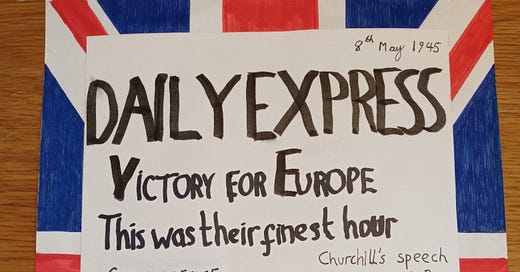This is part two of a blog about how History can be a wider part of school life with some ideas about how History can be more widely promoted in school.
Run a competition
Pupils love a competition. This year, I organised a Key Stage 2 competition for the Spirit of Normandy Trust’s VE Day Poster Competition. I only expected to receive a handful of entries but the response was overwhelming with almost 50 entries! We held a inter school competition with three overall winners but submitted all the entries to the SONT competition.
One could argue that that this was a predominantly creative task, but the level of research some pupils had gone into was obvious. Pupils needed to understand what VE Day was to complete their posters. Many included different pictorial sources in their posters and one had even found out the timings of events on the day.
The Historical Association also runs a historical fiction writing competition for Year 5 and 6, KS3 and KS4, which I am looking into for next year.
Parent Events
Another way of further involving pupils and their families is to hold an events where parents and grandparents are invited into school to engage with their children’s curriculum learning. This can be in any subject so why not History?
This year, I organised a event where parents came into school and created Tudor roses with the pupils. We had a huge turn out for this event. Again, this was an art based task however we also had an exhibition of class work based around our topic that the adults could explore including an exhibition of artwork based on the Tudor monarchs, writing and some timeline work. We also went into the history of the Tudor rose during this session.
In the past, I’ve also organised a Roman museum, Egyptian experience and a Greek exhibition for parents where they have come in to see work linked to our history topic that pupils have produced. This has included art, DT, English, Geography and - of course - history work.
During our Roman museum, pupils dressed up as Romans, gave presentations about what they had learnt and reenacted the battle formations they had found out about during lessons about why the Roman army was so effective. Pupils love sharing what they’ve learnt and these events are a great way of building a relationship with families.
Why not run a club?
There don’t tend to be many history clubs in schools; as stated in Part 1 of this blog, this isn’t a subject that is represented as well in terms of after school clubs. However, if History is promoted in other ways and is a high profile subject in school, does it need a club?
On the other hand, a history club can allow pupils who have a passion for the subject to explore time periods that they’re interested in at a more in depth level. It also gives pupils the chance to look more closely at the history of their own town or village more closely. The Young Archaeologists Club has some great ideas for fun activities using archaeological skills that could be used in an after school club.
https://www.yac-uk.org
It’s certainly something to think about and something I will definitely be considering for the next academic year.





